What is an independent clause? Generally, sentences are constructed using parts of speech. And combinations of all of the forms of English parts of speech. There are many parts of speech, such as nouns, pronouns, verbs, adverbs, adjectives, prepositions, conjunctions, and interjections.
Moreover, there are also different parts of a sentence. For example, the subject and the predicate or object are excluded from the previously listed parts of speech. When the parts of speech get combined, clauses get created. As soon as clauses are added to the sentence, a complete sentence is typically constructed. Every complete sentence should have at least one independent clause or a mixture of a subject and a predicate.
This guide below will discuss the importance of independent and dependent clauses. By understanding dependent and independent clauses, you can understand why they’re used in English and their intended purpose.
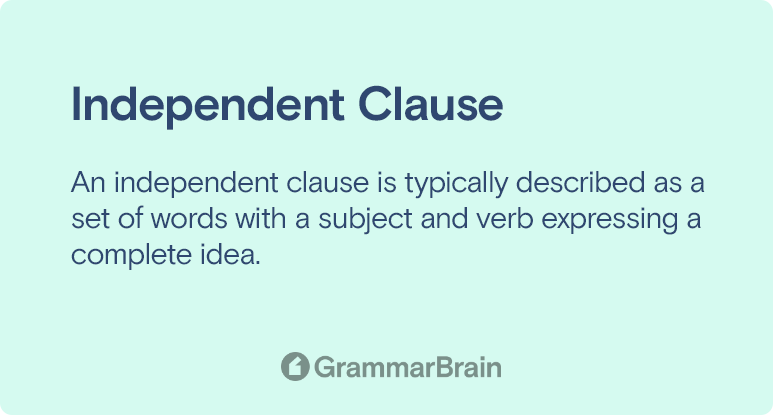
What Is A Clause?
As we’re discussing the independent and dependent clauses, you might wonder, “What is a clause exactly?” A clause is typically a group of related words with a subject, verb,or verb phrase. These are considered the basics of creating complete sentences in the English language.
These subjects and verbs should be related. Generally, it means that the subject is accomplishing the verb in a clause, even though the verb might not be the action verb (for instance, ‘it’ isnot an action verb). Also, a verb might be refused (for example, “not” → not going).
If a subject (implied or stated) is connected to a verb, then a phrase is a clause.
- The subject is a thing or person that is being something or accomplishing something.
- A verb is an action word
- The subject completes the verb.
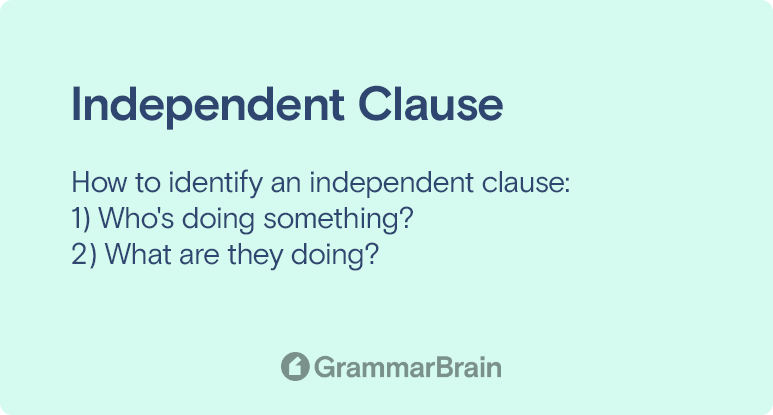
Here are examples:
- She smiled at him (The subject here is She, and the verb here is smiled.)
- The puppy jumped over the barricade. (The subject here is the dog doing the action, and the verb here is jumped as it’s the action.)
- A verb can even describe a state, for example, have, be, see, like, etc.
- My instructor told us to do it faster. (The subject here is My instructor, and the verb is told.)
Another example:
- Dad will be home shortly. (The subject here is ‘Mom’, and the verb here is ‘be’.)
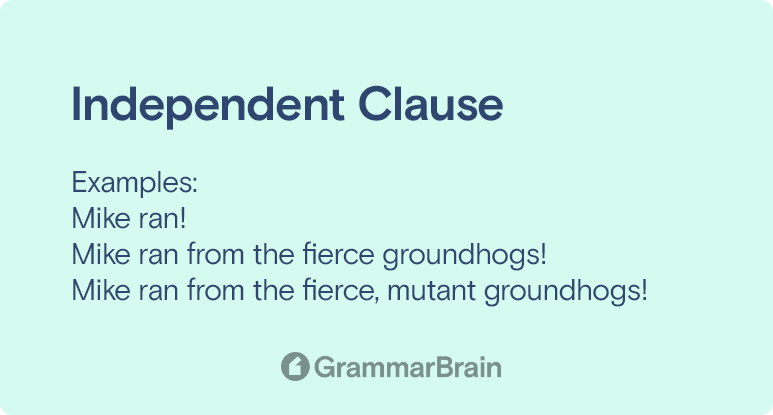
Types of Clauses
There are several clauses, but here we are only going to discuss two primary types of clauses. These are:
- Dependent Clauses
- Independent Clauses
What Is Dependent Clause?
Dependent clauses have a subject and a verb. However, don’t convey a complete idea or complete sentence. A dependent clause can act as an adjective, adverb, and noun.
Dependent Clause = Incomplete Reflection
Remember, only using a dependent clause doesn’t construct complete sentences. It only makes a comprehendible sentence when you join independent clauses to it.
Here are a few word examples that will explain this in more detail:
Examples:
These are not complete sentences and merely sentence fragments.
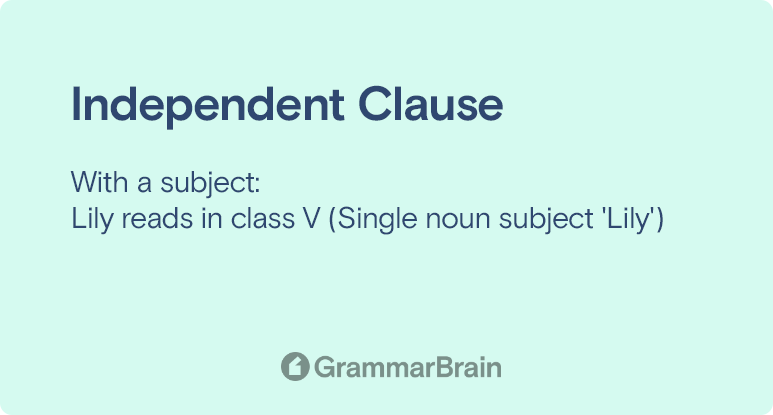
What Is an Independent Clause?
An independent clause is typically described as a set of words with a subject and verb expressing a complete idea.
Independent clauses express a complete thought when used with other parts of speech. Independent clauses can stand independently as a whole sentence, even if it’s just a part of one more significant sentence.
Independent clauses or independent sentences are formed as soon as the subject performs some action. A subject in a complete sentence is the noun doing the action. At the same time, a verb in the sentence is an action the sentence subject does. Independent clauses can occur in simple, complex, compound forms. And also compound-complex sentences.
Do you know how to identify independent clauses?
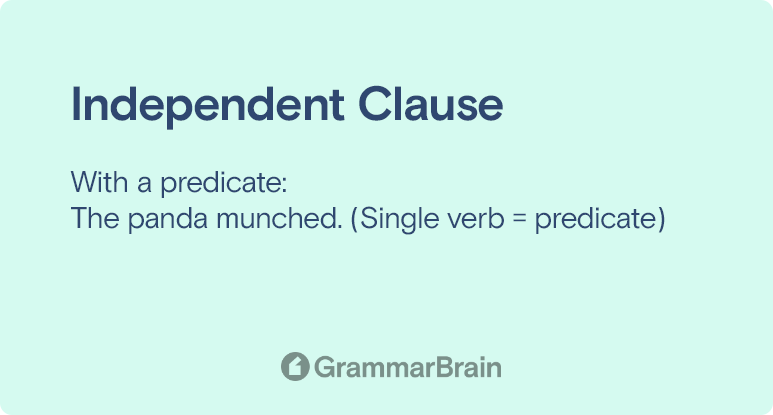
To do that, ask yourself these two questions:
- Who’s doing something?
- What are they doing?
You’ve got an independent clause if you can answer these two questions.
The most straightforward sentence is an independent clause that can be constructed as a single-word imperative sentence using an understood subject, “you.” It becomes an independent clause like:
- Run!
Who’s performing something? You, the listener or reader, are performing something here. What are you performing on? You’re ordered to run. ‘You’ is the subject, and the word ‘run’ is the verb.
If the phrase has a subject and verb, as well as expresses a complete thought, it can become an independent clause:
- Mike ran!
- Mike ran from the fierce groundhogs!
- Mike ran from the fierce, mutant groundhogs!
Parts of An Independent Clause
An independent clause needs 2 main things: a subject and a predicate. However, they can have objects and modifiers to make the information getting portrayed more detailed.
Subject
The subject is something or someone that’s “doing” the action in a sentence. Often, it is only a single noun (a place, person, idea, or thing), but it also can be a noun phrase or a gerund that uses different modifiers.
For example:
- Lily reads in class V (Single noun subject ‘Lily’)
Predicate
The predicate describes the action of the sentence. It can be a single verb or a verb phrase.
For example:
- The panda munched. (Single verb = predicate)
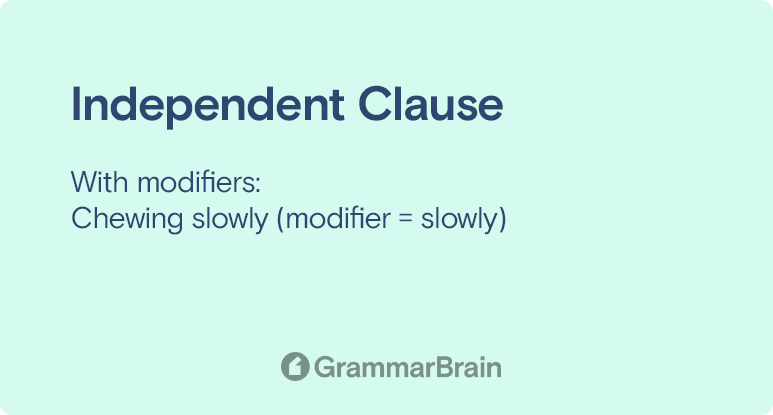
Modifiers
These are adjectives and adverbs that “modify” other words by including more details.
For example:
- Chewing slowly
Objects
The object is typically a thing in the sentence that accepts the verb’s action. Several independent clauses will add objects and make thoughts more complete.
For example:
- Pandas eat bamboo.
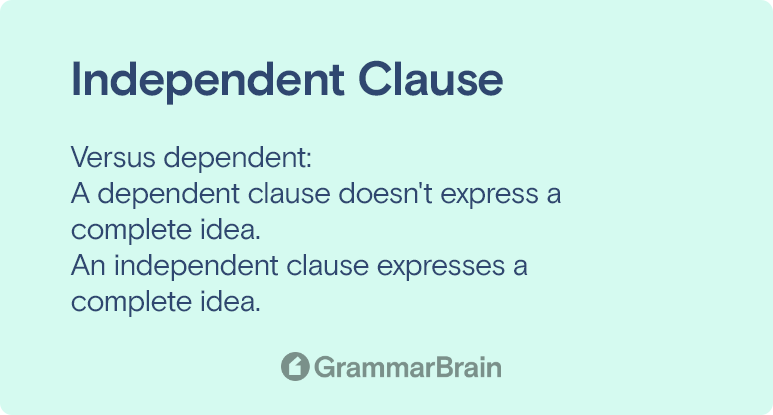
What is the Difference Between An Independent Clause and A Dependent Clause?
A dependent clause is typically a set of words with a subject and a predicate. However, it does not represent a complete thought or idea.
An independent clause is typically a set of words with a subject and a predicate and expresses a whole thought.
Think of the difference as either complete or fragmented.
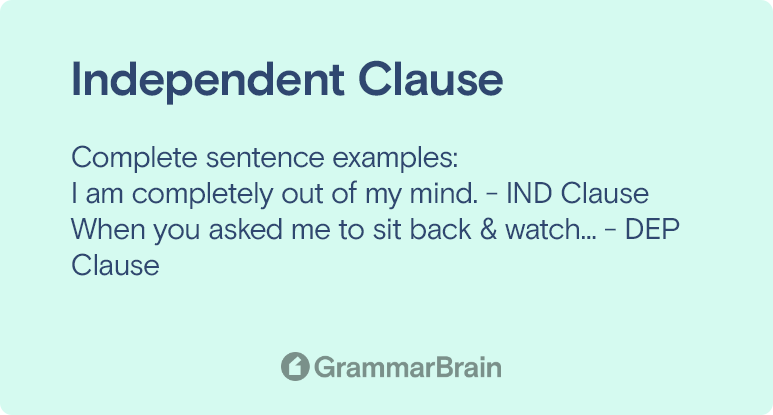
Complete Idea
- A dependent clause doesn’t express a complete idea.
- An independent clause expresses a complete idea.
Availability
- The dependent clauses can’t be seen in every sentence.
- While independent clauses can be seen in every sentence.
Conjunctions
- Dependent clauses include subordinating conjunctions
- Independent Clauses can be merged with coordinating conjunctions.
How to Connect Dependent and Independent Clauses
Here is how to connect the first independent and dependent clauses to complete the sentence structure.
Connect Independent with Subordinating Conjunctions
Independent clauses are associated with dependent clauses using a subordinating conjunction such as:
- Although
- After
- As
- Before
- Because
- Even though
- Even if
- If
- Rather than
- Provided
- So that
- Since
- Though
- Than
- Until
- Unless
- While
- Whether
- That
- How
- Where
- When
- What
Connect Independent with Subordinating Conjunctions Relative Pronoun
Independent clauses are associated with dependent clauses using a relative pronoun such as:
Look at the examples below:
- If I hold you closer than this, I’d be on the other side of you. (The dependent clause is combined with the independent clause using the subordinating conjunction “if.”)
Connect Multiple Independent Clauses Using Coordinating Conjunctions
IND Clause + Coordinating Conjunction + IND Clause
For Example:
My father is sleeping next door, and my mother is reading
Coordinating conjunctions are linking words that are utilized to connect independent clauses. There’re 7 coordinating conjunctions. Such as:
- And
- For
- So
- But
- Nor
- Yet
- Or
Coordinating conjunctions are generally placed after the first independent clause and before the second independent clause. It’s not uncommon to use a comma before the coordinating conjunction between the two independent clauses.
Examples:
- Lina wanted to watch a movie, so Mike drove her to the theater.
Lina wanted to watch a movie and Mike drove her to the theater are two independent clauses since their complete sentences. They’re linked with the coordinating conjunction “so.” - He likes to eat cooked carrots, but his wife likes raw carrots.
He likes to eat cooked carrots and His wife likes raw carrots, which are two independent clauses since they are complete sentences. They’re linked with the coordinating conjunction.
Connect The Independent Clauses Using Only A Semicolon (;)
IND Clause + ; + IND Clause
For example:
My father is sleeping next door; my mother is reading in this room.
Semicolons can join two independent clauses without a coordinating conjunction.
For Example:
- The cat likes my blanket; she sleeps with me on my bed.
- That chair broke; it’s time to purchase a new one.
- The trees are stunning; it’s autumn here.
Connect independent clauses with an independent transition word
IND Clause + IND Transition Word + IND Clause
Example: My mother is sleeping; however my father is reading a book.
Independent transition words are another way to connect clauses. These words are used at the beginning of an independent clause.
Some common independent transition words:
- Consequently
- Also
- Therefore
- However
- Furthermore
- Nevertheless
- Moreover
Examples of Independent Clauses in Sentences
Let’s take a closer look at a few examples of using an independent clause that can function within a sentence. The independent clause in the sentence will be emphasized in bold.
I am completely out of my mind when you asked me to sit back & watch. (Complex Sentence)
- I am completely out of my mind. – IND Clause
- When you asked me to sit back & watch… – DEP Clause
- When is a Subordinating Conjunction
I love watching movies and I’ll go tomorrow. (Compound Sentence)
- I love watching. – Ind. Clause
- I’ll go tomorrow. – Ind. Clause
Independent Clause Using Semicolons
A semicolon is a type of punctuation mark. It joins independent clauses that can easily be divided using a full stop (.). Still, the writer decided to avoid pausing, or the speaker showed the quickness to mention 2 complete sentences without hesitation, reflecting the action of the impulsive speaker (intentional).
I am full; I only had ice cream and cake.
- I am full. – Indipendent Clause
- I only had ice cream and cake. – Indipendent Clause
More Examples in Sentences:
- I went to the beach yesterday (;) let’s not go there today.
- I love to read so Bring me a few books.
- Go check on your sister as she has a cold today.
- He regularly goes to the office (;) he is always on time.
Common mistakes to avoid
Here are a few common errors people make. So, let’s have a look below:
Fused Sentences
A fused sentence happens as soon as 2 independent clauses are not divided by any kind of punctuation mark. This error is even known as the run-on sentence. This error can often be fixed by simply adding a colon, semicolon, or period to split the 2 sentences.
Incorrect Sentence Example:
- My teacher is brilliant I have learned plenty of things from him.
Correct Sentence Example:
- My teacher is brilliant. I have learned plenty of things from him.
- My teacher is brilliant; I have learned plenty of things from him.
- My teacher is brilliant, and I have learned plenty of things from him.
- My teacher is brilliant; moreover, I have learned plenty of things from him.
Comma Splices
A comma splice is the usage of a comma between 2 independent clauses. A writer can correct the mistake by adjusting the comma to a period. Making the 2 clauses into 2 separate sentences by changing the comma to a semicolon or simply by making 1 clause dependent by placing a dependent marker word in the front.
Incorrect Sentence Example:
I like the class, it’s very interesting.
Correct Sentence Example:
- I like the class. It’s very interesting.
- I like the class; it’s very interesting.
- I like the class, and it’s very interesting.
- I like the class because it’s very interesting.
- Because the class is very interesting, I like it
Sentence Fragments
Sentence fragments occur by treating the dependent clause or other incomplete thoughts as a whole sentence. You can settle this mistake by combining it with another sentence and making an entire thought or simply erasing the dependent marker word.
Incorrect Sentence Example:
Because I completely forgot the examination was today.
Correct Sentence Example:
- Because I completely forgot the examination was today, I did not study for the exam.
- I completely forgot the examination was today.
FAQs
What is an independent clause In a simple sentence?
A simple sentence is generally constructed using one independent clause. Here, the independent clause is typically a set of words that has a subject and a predicate and builds a whole idea when alone.
In this case, the subject of the simple sentence means something or someone (the subject has at least 1 noun or pronoun).
For example:
- Traffic flowed across the narrow bridge
What is dependent clause and examples?
A dependent clause is typically a set of words with a subject and verb but doesn’t convey a complete idea. The dependent clauses can’t be a complete sentence but a sentence fragment. Often the dependent clauses are characterized by a dependent marker word.
For example:
- When Lisa studied for her chemistry quiz (Incorrect)
- Lisa studied for her chemistry quiz because tomorrow is her test. (correct)
What is an independent clause, and what are examples of them?
An independent clause is typically the mixture of at least 1 subject and a predicate that makes complete sense. It represents a complete thought itself.
For instance:
- The waves crashed onto the shore.
How does an adverbial dependent clause work?
A dependent clause can function in many ways. It can function as a noun, an adjective, or as an adverb. These are called nominal , adjectival, and adverbial dependent clauses.
Inside this article
Fact checked:
Content is rigorously reviewed by a team of qualified and experienced fact checkers. Fact checkers review articles for factual accuracy, relevance, and timeliness. Learn more.
Core lessons
Glossary
- Abstract Noun
- Accusative Case
- Anecdote
- Antonym
- Active Sentence
- Adverb
- Adjective
- Allegory
- Alliteration
- Adjective Clause
- Adjective Phrase
- Ampersand
- Anastrophe
- Adverbial Clause
- Appositive Phrase
- Clause
- Compound Adjective
- Complex Sentence
- Compound Words
- Compound Predicate
- Common Noun
- Comparative Adjective
- Comparative and Superlative
- Compound Noun
- Compound Subject
- Compound Sentence
- Copular Verb
- Collective Noun
- Colloquialism
- Conciseness
- Consonance
- Conditional
- Concrete Noun
- Conjunction
- Conjugation
- Conditional Sentence
- Comma Splice
- Correlative Conjunction
- Coordinating Conjunction
- Coordinate Adjective
- Cumulative Adjective
- Dative Case
- Determiner
- Declarative Sentence
- Declarative Statement
- Direct Object Pronoun
- Direct Object
- Diction
- Diphthong
- Dangling Modifier
- Demonstrative Pronoun
- Demonstrative Adjective
- Direct Characterization
- Definite Article
- Doublespeak
- False Dilemma Fallacy
- Future Perfect Progressive
- Future Simple
- Future Perfect Continuous
- Future Perfect
- First Conditional
- Irregular Adjective
- Irregular Verb
- Imperative Sentence
- Indefinite Article
- Intransitive Verb
- Introductory Phrase
- Indefinite Pronoun
- Indirect Characterization
- Interrogative Sentence
- Intensive Pronoun
- Inanimate Object
- Indefinite Tense
- Infinitive Phrase
- Interjection
- Intensifier
- Infinitive
- Indicative Mood
- Participle
- Parallelism
- Prepositional Phrase
- Past Simple Tense
- Past Continuous Tense
- Past Perfect Tense
- Past Progressive Tense
- Present Simple Tense
- Present Perfect Tense
- Personal Pronoun
- Personification
- Persuasive Writing
- Parallel Structure
- Phrasal Verb
- Predicate Adjective
- Predicate Nominative
- Phonetic Language
- Plural Noun
- Punctuation
- Punctuation Marks
- Preposition
- Preposition of Place
- Parts of Speech
- Possessive Adjective
- Possessive Determiner
- Possessive Case
- Possessive Noun
- Proper Adjective
- Proper Noun
- Present Participle
- Prefix
- Predicate



